Student Directory
CURRENT STUDENTS
Jennifer Baltzegar
 Ph.D. Candidate | Genetics | College of Agriculture and Life Sciences
Ph.D. Candidate | Genetics | College of Agriculture and Life Sciences
2014 IGERT Cohort | Agricultural Pests
1549 Thomas Hall | Email: jfbaltze@ncsu.edu
What IGERT means to me: “A well-rounded and inclusive approach to disentangling complicated problems results in better solutions.”
IGERT Involvement
Baltzegar joined the 2014 IGERT Cohort, which focuses on agricultural pests. The cohort traveled to Mexico during the summer of 2014 to learn about the social and biological implications of genetic engineering in the country, particularly as that relates to the cultural importance of maize. The experience was eye-opening with respect to how complicated and nuanced the subject of genetic engineering is. More recently, she has worked with her cohort to write a paper geared toward an interdisciplinary audience titled Anticipating Complexity in the Deployment of Gene Drive Insects in Agriculture.
Back to top
Jessica Cavin Barnes
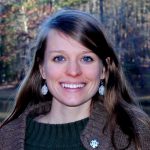 Ph.D. Candidate | Forestry and Environmental Resources | College of Natural Resources
Ph.D. Candidate | Forestry and Environmental Resources | College of Natural Resources
2014 IGERT Cohort | Agricultural Pests
Email: jcavinbarnes@ncsu.edu
What IGERT means to me: “Bringing an integrated and long-term perspective to questions about the governance of natural resources.”
IGERT Involvement
Jessica is a member of the third IGERT cohort, which focuses on the genetic management of insect pests in agriculture. For the past two years, she has worked with her cohort to examine the many dimensions of the release of engineered pests, including the potential release of those with gene drives, in various socio-ecological systems. In summer 2014, she traveled with her cohort to Mexico City and the headquarters of the International Maize and Wheat Improvement Center (CIMMYT). There, she gained an applied understanding of the complexity of natural resource and biotechnology governance, particularly in regions characterized by important centers of biological and cultural diversity.
Back to top
S. Kathleen (Katie) Barnhill-Dilling
 Ph.D. Candidate | Forestry and Environmental Resources | College of Natural Resources
Ph.D. Candidate | Forestry and Environmental Resources | College of Natural Resources
1 Year IGERT Fellow
Email: katie@barnhill-dilling.com
What IGERT means to me: “Offering ongoing and dynamic inter- and transdisciplinary spaces, where important experience working in and communicating with a variety of expertise in social and natural sciences can be gained.”
IGERT Involvement
Katie was a 1 Year IGERT Fellow from 2016-2017, but has worked with the Genetic Engineering & Society Center throughout her doctoral studies. She has been a facilitator and participant in A Roadmap to Gene Drives: A Deliberative Workshop to Develop Frameworks for Research and Governance and the USDA Stakeholder Workshop on Coexistence, both incredible opportunities to develop further engagement and facilitation experience. Katie was also a 2016 NSF Graduate Fellow in the Cultivating Cultures of Ethics in STEM project, facilitating focus groups to explore how a variety of stakeholders make sense of responsible innovation.
Back to top
Johanna Elsensohn
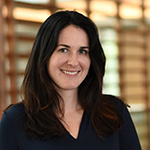 Ph.D. Candidate | Entomology | College of Agriculture and Life Sciences
Ph.D. Candidate | Entomology | College of Agriculture and Life Sciences
2014 IGERT Cohort | Agricultural Pests
1545 Thomas Hall | Email: jeelsens@ncsu.edu
What IGERT means to me: “A better ability to examine and understand the complexities involved not only in emerging technology research, but also in sustainable agriculture and entomology.”
IGERT Involvement
The IGERT program has allowed Johanna to broaden her scope of disciplinary research, putting it within a larger perspective. Insects, technologies, and agriculture do not exist in isolation, but are integral parts of all societies. Societal values and concerns significantly impact agriculture, from how food is raised (e.g., antibiotic-free) to how it is sold (e.g., GMO labeling). Accordingly, her work aims to reflect both the goals of sustainability and those of local communities. An iterative, transparent process of engaging experts, technology adopters (e.g., growers), and communities about the associated risks and suitability of emerging pest control technologies is needed.
Back to top
Nicole Gutzmann
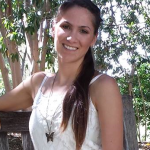 Ph.D. Candidate | Entomology | College of Agriculture and Life Sciences
Ph.D. Candidate | Entomology | College of Agriculture and Life Sciences
2014 IGERT Cohort | Agricultural Pests
Email: negutzma@ncsu.edu
What IGERT means to me: “Bringing together the cultures of diverse academic disciplines so that broader insights about global challenges can be gained.”
IGERT Involvement
Nicole Gutzmann is an interdisciplinary student currently working on a Doctorate of Philosophy in Entomology with a minor in Genetic Engineering and Society. She is a member of the Insect Genetic Technologies Research Coordination Network, Entomological Society of America, Genetic Engineering and Society Center, and the National Corn Growers Association. She has previously held positions as a student coordinator for a biotechnology seminar series, a public outreach coordinator for the Entomology Graduate Student Association (EGSA), and a fellow on the interdisciplinary grant, NSF IGERT.
Back to top
Mike Jones
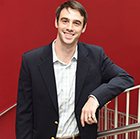 Ph.D. Candidate | Agricultural and Resource Economics | College of Agriculture and Life Sciences
Ph.D. Candidate | Agricultural and Resource Economics | College of Agriculture and Life Sciences
2014 IGERT Cohort | Agricultural Pests
Email: msjones2@ncsu.edu
What IGERT means to me: “Providing a valuable window into the complexity of ‘improved’ varietal adoption and context to understand the controversy of genetically modified (GM) crop introduction.”
IGERT Involvement
Mike is part of the 2014 IGERT cohort focusing on agricultural insect pests. His current research interests include post-harvest crop management and biotechnology possibilities to improve smallholder agriculture in the developing world. The IGERT cohort trip to rural southern Mexico, with a heavily indigenous population of small- and medium-scale producers, provided a valuable window into the complexity of ‘improved’ varietal adoption and context to understand the controversy of genetically modified (GM) crop introduction. This perspective has informed current research on GM crop impacts for small farmers in East Asia.
Back to top
Caroline Leitschuh
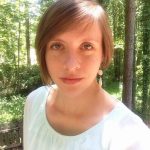 Ph.D. Candidate | Biological Sciences | College of Sciences
Ph.D. Candidate | Biological Sciences | College of Sciences
2013 IGERT Cohort | Invasive Rodents and Biodiversity Conservation
137 David Clark Labs | Email: cleitsc@ncsu.edu
What IGERT means to me: “Developing skills communicating science as well as creating more opportunities for graduate students to participate in outreach and communication.”
IGERT Involvement
Caroline is a doctoral student in the Zoology program at NCSU, as well as a member of the 2013 IGERT cohort. Her cohort examines how genetic engineering can be used to eradicate invasive house mice from islands. As a member of this cohort, Caroline studies aspects of why house mice are able to adapt to new environments easily and quickly. In 2014, the cohort published a website titled Conserving Island Biodiversity, which focuses on the history of invasive house mice and current options for eradication.
Back to top
Pat Roberts
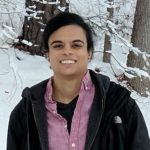 Ph.D. Candidate | Public Administration | College of Humanities and Social Sciences
Ph.D. Candidate | Public Administration | College of Humanities and Social Sciences
1 Year IGERT Fellow
Email: jprober2@ncsu.edu
What IGERT means to me: “Working with scholars from various disciplines in the natural sciences and engineering to broaden the scope of the doctoral research undertaken.”
IGERT Involvement
Pat Roberts is an interdisciplinary student currently working on a Doctorate of Philosophy in Public Administration with a minor in Genetic Engineering and Society. As a 1 Year IGERT Fellow, Pat has been able to work with scholars from various disciplines in the natural sciences and engineering, and broaden the scope of the doctoral research undertaken. Pat primarily works at the intersection of politics, policy, and emerging biotechnologies, with current dissertation research exploring issues at the boundaries between different sectors in biotechnology research and innovation.
Back to top
Megan Serr
 Ph.D. Candidate | Biological Sciences | College of Sciences
Ph.D. Candidate | Biological Sciences | College of Sciences
2013 IGERT Cohort | Invasive Rodents and Biodiversity Conservation
Email: meserr@ncsu.edu
What IGERT means to me: “Helping to expand conservation research knowledge areas into urban biodiversity diversity.”
IGERT Involvement
Megan is a member of the invasive mouse cohort that focuses on eradicating invasive rodents from islands. In 2013, the cohort traveled around the Farallon islands, which is also where Megan and Dr. Lisa McGraw collected live wild mice for behavioral research purposes. Megan considers the experiences of the Farallon islands a reminder as to the importance of conservation biology as an interdisciplinary field. The cohort’s focus is on exploring the potential for a genetic technique that would create a male biased-population, hence causing the population to die off.
Back to top
Jayce Sudweeks
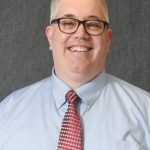 Ph.D. Candidate | Public Administration | College of Humanities and Social Sciences
Ph.D. Candidate | Public Administration | College of Humanities and Social Sciences
2014 IGERT Cohort | Agricultural Pests
Email: jdsudwee@ncsu.edu
What IGERT means to me: “Identifying the complex and conflicting milieu in which important biotechnology policy decisions are made and how differing coalitions can come to agreement on important technologies that will better the life of mankind.”
IGERT Involvement
Jayce is part of the 2014 NCSU IGERT cohort, which focuses on the implications of genetic modification in agriculturally important pests. As part of their training, his cohort spent three weeks in Mexico in 2014 studying the cultural, social and biological implications of genetic engineering with a special focus on maize. More recently, Jayce co-authored, with his cohort, an interdisciplinary article, One Drive Does Not Fit All: Visualizing the Complexity of Gene Drive Deployment Using Adaptive Landscapes.
Back to top
Rene Xavier Valdez
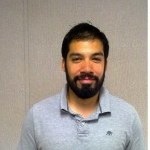 Ph.D. Candidate | Forestry and Environmental Resources | College of Natural Resources
Ph.D. Candidate | Forestry and Environmental Resources | College of Natural Resources
2013 IGERT Cohort | Invasive Rodents and Biodiversity Conservation
Email: rxvaldez@ncsu.edu
What IGERT means to me: “Examining a wide array of topics including climate change literacy, invasive species management, and the emerging field of de-extinction.”
IGERT Involvement
Rene is a part of the 2013 IGERT cohort, focusing on the potential use of genetic engineering techniques for biodiversity conservation. The cohort’s trip across California provided a multitude of perspectives on the challenges of conservation in both wild and urban places. That experience has informed Rene’s research and motivated his engagement in interdisciplinary pursuits. His dissertation research examines various topics including climate change literacy, invasive species management, and the emerging field of de-extinction.
Back to top
Michael Vella
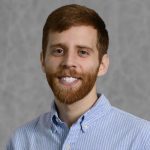 Ph.D. Candidate | Biomathematics | College of Sciences
Ph.D. Candidate | Biomathematics | College of Sciences
1 Year IGERT Fellow
Email: mrvella@ncsu.edu
What IGERT means to me: “Expanding areas of study to include a broad range of topics; exploring and understanding concepts from social science, policy, and ethics.”
IGERT Involvement
As an IGERT fellow, Michael has enjoyed expanding his areas of study to include a broad range of topics. Exploring and understanding concepts from social science, policy, and ethics has been important to shape and enhance his dissertation research. Michael has also taken advantage of opportunities to gain experience applying such concepts by becoming involved with events at NCSU as part of the GES center. Michael has participated in workshops hosted by the GES center, such as A Roadmap to Gene Drives: A Deliberative Workshop to Develop Frameworks for Research and Governance.
Back to top
Sophia Webster
 Ph.D. Candidate | Entomology | College of Agriculture and Life Sciences
Ph.D. Candidate | Entomology | College of Agriculture and Life Sciences
2012 IGERT Cohort | Mosquitoes and Human Health
1549 Thomas Hall | Email: shwebster@ncsu.edu
What IGERT means to me: “Developing extremely valuable interdisciplinary research and communication skills for a successful scientific career.”
IGERT Involvement
Sophia is part of the 2012 IGERT cohort whose focus is mosquitoes and human health. The first IGERT course took place in Lima and Iquitos, Peru where the cohort attended tropical medicine symposiums, visited health clinics and several farms to speak with farmers. The cohort also shadowed NAMRU workers door to door in in Iquitos as the workers completed their household mosquito checks and surveys. Additionally, the cohort conducted household experiments on the density dependent effects of mosquito larvae in household containers.
Back to top
Alumni
Tim Antonelli, Ph.D.
 Assistant Professor | Mathematics | Worcester State University
Assistant Professor | Mathematics | Worcester State University
2012 IGERT Cohort | Mosquitoes and Human Health
What IGERT means to me: “Connecting with students of diverse backgrounds and better communicating the variety of real-world applications that mathematics has to offer.”
IGERT Involvement
During his time at NC State, Tim participated in the 2012 IGERT cohort whose focus on genetic pest management aligned with his research interests. IGERT provided many singular graduate experiences, such as the opportunity to travel to Peru to study the feasibility and public perception of genetic pest management among health workers, government officials, students, and citizens in areas affected by dengue. The personal connections that IGERT helped establish allowed Tim to return to collect data and estimate parameters for models of the growth of Ae. aegypti larvae in field containers in Iquitos, Peru.
Back to top
Gregory Backus, Ph.D.
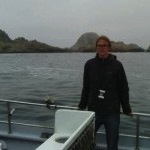 Post-doctoral Fellow | Environmental Science and Policy | University of California, Davis
Post-doctoral Fellow | Environmental Science and Policy | University of California, Davis
2013 IGERT Cohort | Invasive Rodents and Biodiversity Conservation
What IGERT means to me: “Communicating about sensitive and controversial issues while coordinating between a great variety of people from different backgrounds.”
IGERT Involvement
Greg was a member of the 2013 IGERT cohort that focused on the application of genetic engineering for conservation. With the rest of the cohort, Greg visited California where he learned about eradication of invasive species to protect threatened island ecosystems. At the several destinations they visited, including Santa Catalina Island, Santa Cruz Island, Angel Island, and the Farallon Islands, they were introduced to the complicated ecological, social, and regulatory issues related to invasive species eradication.
Back to top
Molly Hartzog, Ph.D.
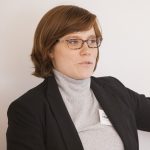 Assistant Professor | English and Foreign Languages | Frostburg State University
Assistant Professor | English and Foreign Languages | Frostburg State University
2012 IGERT Cohort | Mosquitoes and Human Health
What IGERT means to me: “Exploring the nexus of rhetorical invention and scientific invention in the context of genetic engineering and disease control.”
IGERT Involvement
Dr. Molly Hartzog completed her PhD in Communication, Rhetoric, and Digital Media in May 2016. Her dissertation, “Inventing Mosquitoes: Digital Organisms as Rhetorical Boundary Objects in Genetic Pest Management for Dengue and Malaria Control,” won the 2016 College of Humanities and Social Sciences Dissertation Award. That fall, she joined Frostburg State University as Assistant Professor in the department of English and Foreign Languages, where she teaches professional writing.
Back to top
Arina Loghin, M.S.
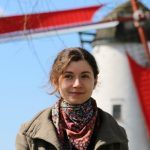 Meditative Dancer | Dance Home
Meditative Dancer | Dance Home
2012 IGERT Cohort Associate | Mosquitoes and Human Health
Email: danceauthenticlife@gmail.com
What IGERT means to me: “Understanding of the mutually transforming relationships among people, nature and technology.”
IGERT Involvement
Arina was the Cultural Anthropology Master’s student completing the GES Graduate Minor with the first cohort. The knowledge she gathered from GES courses and activities contributed to her Master’s thesis, Who is an actor? Analyzing Agency in a Lab’s Social World. As part of IGERT, she was also a panelist at the 2013 Fulbright Global Food Security Seminar in Raleigh. For her thesis, Arina conducted an ethnographic study of scientists’ interactions with mechanical and biological tools in a Drosophila genetics laboratory at NC State University. She explored the journey of the fruit fly in the lab from insect to data point during the course of a genetics research project.
Back to top
Elizabeth Pitts, Ph.D.
 Assistant Professor | English | University of Pittsburgh
Assistant Professor | English | University of Pittsburgh
2013 IGERT Cohort | Invasive Rodents and Biodiversity Conservation
What IGERT means to me: “Contributing to scholarly conversations in organizational and environmental communication by exploring how negotiations of meaning influence the organizing of genetic engineering governance systems.”
IGERT Involvement
Elizabeth’s interdisciplinary IGERT collaborations have enabled her to develop a thorough understanding of genetic technologies, focusing on case studies including the release of genetically engineered mosquitoes to control the Zika virus, malaria, and dengue fever, and the potential application of genetic engineering for conservation purposes. She has also developed substantial experience as a facilitator of public outreach, having participated in or helped to organize programs at the North Carolina Museum of Natural Sciences, the Durham Museum of Life and Science, and the Chabot Space and Science Center in Oakland, California.
Back to top
Amanda (Clayton) Walsh, Ph.D.
 Senior Economist | RTI International | Research Triangle Park, NC
Senior Economist | RTI International | Research Triangle Park, NC
2012 IGERT Cohort | Mosquitoes and Human Health
What IGERT means to me: “Communicating academic research to diverse audiences and developing robust analytical skills through interdisciplinary and policy-oriented research.”
IGERT Involvement
Amanda’s graduate research focused on using insights from applied microeconomics to study the impacts and control of mosquito-borne disease. Her GES collaborations studying the potential use of genetically modified mosquitoes to combat dengue fever culminated in the co-authorship of the introductory chapter of the text, Genetic Control of Malaria and Dengue, edited by Zach Adelman. She was selected among her GES peers to present their work to academics as well as government and industry representatives at the Second Annual Conference on Governance of Emerging Technologies.